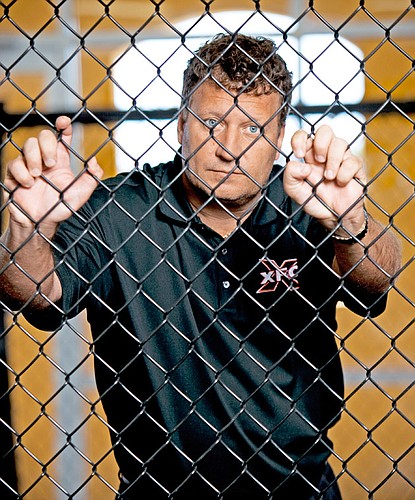Tampa entrepreneur John Prisco is growing Xtreme Fighting Championships into an international brand.
Tampa entrepreneur John Prisco always liked boxing and wrestled in high school in New Jersey.
Years later, after owning a nightclub and developing homes in Florida, Prisco invested in a business that combined with the two athletic skills.
In 2006, Prisco became founder and chief executive officer of Xtreme Fighting Championships, a 15-employee Tampa business that produces mixed martial arts fighting matches and broadcasts them on television nationwide.
It is a sport that has grown quickly, attracting national sponsors such as Gillette and Anheuser-Busch, and pulling a young, mainly male audience, 18 to 35, which likes the faster pace of the sport.
From its Tampa base on Nebraska Avenue, XFC has produced nine extreme fighting shows throughout the Southeast, has opened two branded franchised training centers in Tampa and has international broadcasting contracts with two companies.
Although Prisco would not disclose revenues, he said the company has “turned the corner” financially after 2½ years, especially after signing the two multi-year broadcast contracts in the past 90 days.
“We had a very smart vision,” Prisco, 46, says. “We have incredible talent. Good franchisees. A good product.”
The product is multifaceted. There are the fighting shows, 11 to 12 matches of two barefooted men with small padded gloves battling in a caged mixed martial arts contest — boxing, kicking, wrestling, taking each other down to win points. Prisco has done nine so far in the Southeast, including three shows in Tampa.
XFC also makes money from franchising its XFC training gyms in Tampa and Brandon, which also sell its branded merchandise. And it makes money from its broadcast partners, who pay to get the fighting shows that XFC films.
But Prisco's path to success isn't guaranteed. Other extreme fighting promotion companies have failed, including one that had a broadcast contract with CBS and another in Sarasota run by Andrew Neitlich. While Prisco acknowledged the industry turnover, he said many companies, including Neitlich's, did not have the financial staying power and vision to get established.
“He was into teams, not individual fighters,” Prisco says. “People look at this as an individual sport. You have got to be passionate about it and have to stay the course. It takes time and the correct vision. Not many have had it.
And it takes money. There's a lot of factors.”
XFC says it enjoys an advantage over its rivals because it has the two broadcast contracts with HDNet and ValCom. HDNet will broadcast XFC matches live.
UFC, the behemoth industry leader, has a deal with Spike, a cable channel for men.
Looking ahead, Prisco sees more promotions, more branded products and blue-chip sponsors for XFC. He hopes to keep growing the training gym concept by selling franchises throughout the country. His goal is not to take down
UFC, but to offer an alternative: Up-and-coming fighters instead of big-name players.
And he sees an international TV audience. Prisco is negotiating with 12 countries to get them to pick up the XFC broadcast shows.
Prisco's biggest CEO lessons: Surround yourself with good people and have a long-term vision for them to follow.
“I don't believe in short-term visions,” Prisco says. “Growing a company takes time.”
Some of that time is on the road, on the way and back from XFC shows. This CEO travels with around 70 people, including 22 or 24 fighters, marketing staff and in-house TV production people.
“There are many incredible people,” Prisco says. “I'm impressed with people in this sport.”






